-
Abbas Kiarostami: LIKE SOMEONE IN LOVE (2012)
ABBAS KIAROSTAMI: LIKE SOMEONE IN LOVE (2012)
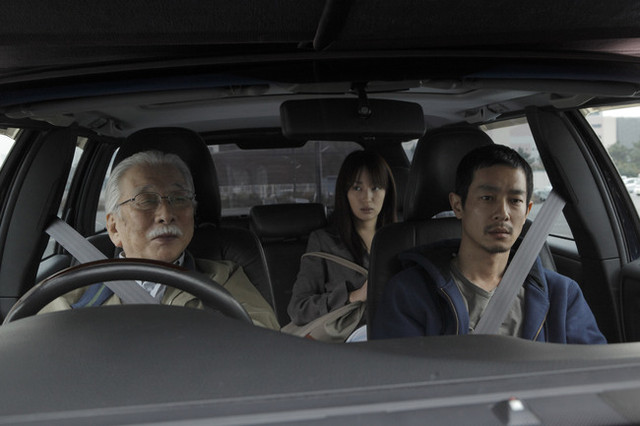
TADASHI OKUNO, RIN TAKANASHI, AND RYO KASE IN LIKE SOMEONE IN LOVE
Changed perceptions
Sometimes a director transplanted to another culture might lose his identity but Abbas Kiarostomi does very well in Like Someone in Love, his study of fantasies and miscalculations shot in Japan. Notably, he combines an inexperienced actor and a real pro with a third principal who never played a lead in decades as an extra, and the effect is thoroughly fascinating. Like Someone -- the Ella Fitzgerald standard -- but nobody really in love, here. What we have is three people, at least one of whom is being taken for a ride. If you see this as alternate couples, maybe there's a link with the director's previous prizewinner, Certified Copy. Both films are about people who are not what the seem. But this new one doesn't have the Mediterranean gloss, pretty settings and enjoyable intellectual identity puzzle. . No Pirandello here, only a girl, a student from the country who moonlights as an escort, spending an apparently platonic evening with an old man, and a young man who thinks he's her fiancé, or who is, but is unaware of her side job, and when he finds out about it, is enraged. This is a rueful look at humanity's foibles and follies, not a pretty puzzler. It has less audience appeal. It shows Kiarostami as a master of the car scenes he loves to do and of bland, repetitive dialogue, but despite the mark of the director's style and polished execution, it's a bit difficult to ferret out a point here, in part because of the shallowness with which the characters are presented.
When the film begins Akiko, the student/escort (Rin Takanashi), is talking to someone in a little nightclub. It's Nagisa (Reiko Mori), her boyfriend, but we don't know that yet and we don't even know at first who's talkng. Kiarostami playfully withholds information and keeps the viewer at one remove from the characters. She is here to receive her assignment, which is to see retired sociology professor Takashi Watanabe (Tadashi Okuno). On the long cab ride, she listens to her phone messages. These consist mainly of a series of progressively more sad calls from her sweet country grandmother, who has come to town to see her, but only for the day, and at the end is about to take the train home after ten p.m. After the last message, when grandma reports she is still sitting near a gate waiting, Akiko has the cabbie circle the station. A pointed irony is that in the station grandma has seen one of the little flyers Akiko put around on her first forays in the escort business, and it says "Akiko" and has her picture, but grandma innocently says it's just a coincidence, and can't be her. This flyer comes up later, because one of the workers in Nagisa's garage has shown it to him.
When Akiko gets to the professor's, he wants to entertain her rather than have sex, though she goes to bed, after a conversation about a painting -- and she's very tired and just wants to sleep. The two are totally at cross purposes. The next morning Watanabe offers to drive Akiko anywhere she wants to go, obviously eager to spend more time with her, and she has him chauffeur her to an exam at school. There she runs into Nagisa, who's angry, it turns out because she hasn't answered her cell all night - doubtless a frequent occurrence. Nagisa sees Watanabe, and eventaully gets into his car and has a conversation about Akiko; he assumes Watanabe is her grandfather. Watanabe keeps his identity vague, but advises Nagisa not to marry Akiko, but merely to enjoy her -- while she lasts, as it were.
We are to think that probably Nagisa's time at his garage with the chap who has the flyer and a frank chat with Akiko when they meet afterward for lunch leads to a fracas, and Akiko summons Watanabe from his flat to pick her up, nursing a swollen jaw, shaken, and shortly pursued by a furious Nagisa, whom, however, we hear but do not see again.
This little tale with its slow revelations to us and to the characters (or Nagisa, anyway) is done with much subtlety, but it also has a chilly, pointless quality, and again leads this reviewer to say yes, Abbas Kiarostami is a master, but of what? and what does it matter, if this is all? This film is intricate and clever, but also somehow inconsequential. Like other Kiarostami films, it is a short-short story on acid, its tiny details blown up and drawn out.
There's no faulting the craft here, the elegant night photography, the skill with which the intimacy (and loneliness) of a car interior is exploited, and the acting. Tadashi is pretty , and in Japanese style, maddeningly tempting and aloof. Okuno is the long-time movie extra, who was tricked into playing a starring role by not revealing the extent of his performance. Probably no one else could have been better, more humble and natural, as this sweet, befuddled old man. Kase, a veteran of many roles, is strong in the only role that requires strength, because Nagisa has values, hopes, and desires and the will to see them through -- though while he thinks Akiko is naive (one of Kiarostami's many little ironies), he is the one who's been tricked.
Like Someone in Love, in Japonese, 109min, debuted at Cannes; had a theatrical release in Japan Sept. 15; debuted Oct. 4 in the US at the New York Film Festival at Lincoln Center, where it was screened for this review; opens in France Oct. 15. Critical reception in France was fair (Allociné press rating 3.3) but some of the most sophisticated publications praised it the most highly (Les Inrockuptibles, L'Humanité, Libération, Cahiers du Cinéma). The US opening is Feb. 15, 2013, which follows an Abbas Kiarostami retrospective at the Film Society of Lincoln Center from February 8-14.
Last edited by Chris Knipp; 07-23-2014 at 11:39 PM.
-
Olivier Assayas: SOMETHING IN THE AIR (2012)
OLIVIER ASSAYAS: SOMETHING IN THE AIR (2012)
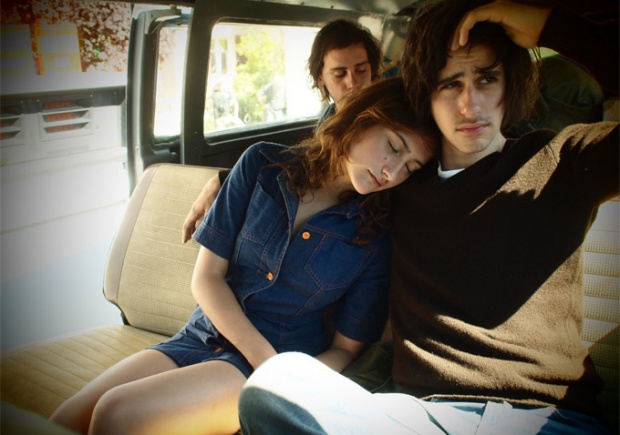
LOLA CRÉTON AND CLÉMENT MÉTÉYER IN SOMETHING IN THE AIR
After Carlos: Assayas does himself in the Seventies
A couple years ago Olivier Assyas impressed the world with his dashing mini-seires biopic about Carlos the Jackel, Carlos, a tale of radical agit-prop and sabotage in the Seventies by a leftist master of mayhem. But despite the success of Carlos it didn't enable Assayas to show his own role in this period, so he made Something in the Air -- original title Après mai, "After May" -- where an alter ego experiences the moment more as the writer-director himself did. This time there are some explosions, but nothing as spectacular as the radical acts in Carlos, though there is vandalism and Molotov cocktails and a blown-up car. The opening political stunts are carried out by lyçée students. Après mai has nothing to do with radical terrorism. It's a story of art and politics, music and love affairs, and how for a 16-20-year-old, they're all mixed up together. If Carlos was Assayas' ultra-cool-terrorist-in-the-Seventies movie, this is his talented-but-confused-French-youth-in-the Seventies movie, and it takes decidedly second place. The content of this second movie is no match for that of the first. Moreover though I know Garrel's film is about 1968 and its immediate aftermath rather than the early Seventies, it was hard not to think of his deeply romantic and compulsively gloomy black and white film Regular Lovers while watching this. And though the newcomer Clément Métayer, who plays Gilles, is engaging and soulful in his sallow, long-faced way, he is no match for Louis Garrel (though he's more like a real French teenager and less like the profile on a Byronic Roman coin). And despite her classic face neither can Lola Créton, who plays Gilles' girlfriend Christine, compete with the subtle charms of Clotilde Hesme. Assayas' new film is beautiful, detailed, and accomplished, almost too rich in splashy details. It might have been move evocative with a lower budget. Nonetheless the chops Assayas built up as a vibrant film historian in Carlos are still evident here, so although no match for the previous film, this is still impressive work with richer detail than most other films of this genre.
Something in the Air is a fumbling and unhelpful title. The actual one, "After May," states the movie's real theme: the disillusion and long search for meaning that followed the heady times of the Sixties. These high school students are a little like the much later Italian ones in Gabriele Muccino's appealing (and swift and economical) debut Come te nessuno mai/Forever in My Mind, who envy their parents' Sixty-Eight activism and start a school revolt, with all the trappings, to relive those days. But Muccino's film knows where the boys' minds are: for them politics is an excuse to lose their virginity. Assayas' world is more complex, and Après mai has a lot of serious discussions of revolutionary theory and political strategy. These kids are older and more serious than Muccino's younger brother, Silvio, with his little earring and his urgent desire to get laid. Gilles is a serious artist, with, like Assayas' own, a father in the movie and writing business; they work together some, and argue about how good or slapdash Gilles' father's screenwriting or Simenon's Maigret novels are. Gilles is leftist in spirit, but art is the stronger calling, and he sticks with it, after the early activism and the continuing friendships with guys who make movies about labor unions in Italy or go to Afghanistan or Nepal, or somewhere.
Assayas gives Gilles/Clément a lot of face time, but he's largely a vehicle for a travelogue of European youth in the early Seventies, and there are some great vinyl rock anthems, various pairings-off and those ardent political discussions. But most of all the director relies on big scenes, climaxing in a summertime visit to the family mansion in the country of Gilles' first failed romance Laure (Carole Combes), when a spectacular hippie drug party is going on, complete with acres of candles, haystack bonfires, and finally a fire that invades part of the house, forcing Laure to leap from an upstairs window (that's all of her for a while). This is a flashier, period version of the party at the end of the director's Summer Hours, a simpler film but a more fully achieved one because it knows what it's doing. But though Après mai/AKA/Something in the Air is a big sprawling shambles, it evokes the Seventies in multifarious and true ways. I think I would watch it again. After all, it's in French, and the French do this sort of thing, the politics, the art, the angst, the clothes, so well.
Something in the Air/Après mai , in French with some English, 122 min., debuted at Venice and was shown at Toronto. Screened for this review as part of the New York Film Festival at Lincoln Center, where it was also included as part of the preferred group of the Main Slate. Released in France, Belgium and Switzerland Nov. 14, 2012, and in NYC and LA May 3, 2013. The French critical reception was generally very positive: Allociné press rating 3.8. based on 24 reviews.
Last edited by Chris Knipp; 04-20-2015 at 09:22 PM.
-
David Chase: NOT FADE AWAY (2012)
DAVID CHASE: NOT FADE AWAY (2012)
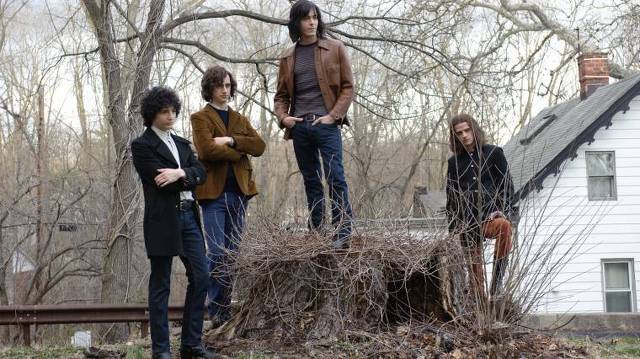
Growing up in a band that doesn't make it big
David Chase, who created the super-successful and groundbreaking HBO series "The Sopranos," has chosen a nostalgic Sixties picture about a garage band for his debut as a movie director. It is a nice little film and has some sharp dialogue, but it trods familiar ground. The one thing that makes it stand out is that this one band for a change belongs to the vast majority that do not go on to become famous, like the Rolling Stones whose songs they covered at first. Instead they basically do fade away. They prove to be not ambitious and hard-working enough to pay their dues at cheap clubs like their idols (or the Beatles in Hamburg), their dissolution sealed with several dropouts and a lead singer who goes to California to study film.
This is an interesting and valid topic but of course runs the risk of being less interesting than the dramatic success stories. Not Fade Away itself fades when compared to a film like Anton Corbijn's 2007 Control, about Joy Division and Ian Curtis, the lead singer who committed suicide just when the band was becoming known (played by Sam Riley in the film). Chase's protagonist, Douglas (John Magaro), is a sometime ditch digger at a golf course semi-obsessed by "The Twilight Zone" who becomes the lead singer of the band. He's no Ian Curtis. He can sing surprisingly well and has also got a nice East Coast edge to his voice when he speaks, but he's just menat to be an Italian-American guy from New Jersey, and to prove it his father Pat, manager of a Pet Boys shop, is played by James Gandolfini, Chase's "Sopranos" star. But that Douglas isn't a future rock idol is the point. Instead the Jersey boys of Chase's movie serve as touchstones for a review of the early Sixties, the period from their late teens to early twenties, through a variety of hair styles and outfits, at a time when Kennedy was assassinated, Vietnam heated up, and rock and roll took on the importance it still has today.
Like the cast of Control, this one learned to play their instruments and sing and perform the music they're seen performing in the scenes. That's a plus. A minus is the extent to which Chase piggy-backs into the period and a sense of the music the same way the characters do, by using clips at key moments. The movie opens with a clip of a Fifties salt-'n-pepper rock and roll band. And when the young band performs one of their covers the sound is spectacular. -- too spectacular. Little discernible effort seems to have been made to duplicate the sound of primitive, limited amplification equipment and instruments.
The other cast members are not bad. Will Brill plays a rich, obnoxious guitarist and Jack Huston is touching as Eugene, the would-be lead singer who can't quite cut it. Bella Heathcote is cute and serviceable as Douglas' girlfriend Grace, who's always liked him and moves in when he becomes visible as a musician. There are mixed messages but at different points she tells him "time is on his side" (echoing the Stones) and she believes in him. Dominique Mcelliogott provides necessary period color as her nutty, drug-damaged sister, whose parents have her committed.
Part of the period portrait is of course the cultural and generational conflicts, Grace's parents with her dysfunctional sister, and Douglas with his dad. There is the obligatory moment when a teenage girl tells the adults at a barbecue that "coloreds" are now to be called "African Americans" (historically inaccurate) and that "fag" is a term that's "unfair to the homosexual community" and should be replaced by "gay" But this sort of thing and the slight references to car culture are secondary. Chase's main object is to declare that he loves rock and roll (with the sui generis sound track of his own personal favorites to prove it) and that the music was the heart of the era and of coming of age for his generation.
It is the essence and distinction of the story that for this band there is no big break, only the usual moments of conflict among band members over roles and direction. There are few original scenes. One memorable one occurs when Douglas' dad (Gandalfini), who has lymphatic cancer (barely acknowledged in the plot except for him mentioning it), takes his son to an Italian seafood restaurant so they can have a "serous talk" about what it might be like for him to take over the family with his father gone. The conversation isn't very memorable, but the moment is. The climactic scene comes when the boys perform for a music producer, and he talks to him afterward. That they'd get a contract is their fantasy. They really aren't that good. And they have, so far, only one original song. He tells them to go and perform in dive bars seven nights a week, to get the experience. Though in the somewhat patchy screenplay it's not openly stated, but they're really not as a group willing or able to do this, and so this is a pivotal moment between rock and roll dreams and everyday reality.
The original song was composed by Steven Van Zandt, a "Sopranos" cast member and the musical guru for the film, who helped the actors develop into a band and even got a drum coach for Magaro who played with the Beatles. Working together for three or four months before the sixty-day shoot, the core cast of guys became friends, and their camaraderie no doubt contributes to the spirit of the film, which is very positive. But it's hard to say -- is this movie a success? I'd say not so much, but it is what you make of it, since it's riddled with pop touchstones and standard rocker coming of age scenes.
Prodouced by Paramount and distributed by the Weinstein Company, Not Fade Away is scheduled for a limited US release December 21. Screened for this review as part of the New York Film Festival at Lincoln Center, where it premieres and is one of the Main Slate films.
Last edited by Chris Knipp; 07-23-2014 at 11:17 PM.
-
Michael Haneke: AMOUR (2012)
MICHAEL HANEKE: AMOUR (2012)

JEAN-LOUIS TRINTIGNANT AND EMANUELLE RIVA IN AMOUR
[S P O I L E R S]
Loyalty to the end
In Amour Michael Haneke has delivered another masterpiece, notable this time for its humanity and sweetness as well as austerity. The latter is a kind of respect, because nobody is allowed to matter in this movie but a dying old woman and the man who cares for her. There are no phone calls, appointments, doctors, or really any scenes outside the couple's big, comfortable, elegant old Paris apartment, after the first scene. Though this is a grueling and painful watch, it's also uplifting. "Amour," love, really is the subject, the ultimate test and ultimate proof of what love is. As Mike D'Angelo puts it in the excellent review he wrote for AV Club from Cannes, where this won the Palme d'Or, this film "movingly illustrates the pragmatic sentiment that Terence Davies inserted into his recent adaptation of Terence Rattigan’s The Deep Blue Sea, viz. that true love isn’t candy hearts and flowers but wiping someone’s ass when they can no longer do it themselves." That's what happens to Anne (Emanuelle Riva), and her husband of many years, Georges (Jean-Louis Trintignant) is the person who does the job.
It happens after a concert by Alexandre (Alexandre Tharaud), focused on Schubert, and he turns out to have been a former student of Anne's, she and Georges both music teachers, now retired. When they come home, someone has tried to jimmy the lock of their front door -- a Haneke-esque clue to impending danger, a reminder perhaps that since they're both eighty-something, the protective shell outside their existence is eggshell-thin. The next morning at breakfast Anne has a sudden period of catatonia. Tests (we don't see them) reveal the need for an operation, but it's not successful, and when she returns from the hospital, begging Georges never to let her go back, she is paralyzed on one side from a stroke and in a wheel chair. Things will go downhill from there. At first Anne's hair is still beautifully styled, and she can sit up and eat, and talk normally. She asks for photo books and looks at their personal and family record. "It's beautiful, she says. This long life."
The specific incidents and scenes are important of course, but it won't convey much to describe them here. What this is really about is the way Georges remains present, taking on as his one duty caring for his wife, whatever happens. This isn't only the ultimate test but also beyond him; nurses have to come in part-time. Georges is very nice but he can be mean sometimes, Anne remarks. He is harsh with her once, when she has reached an almost ultimate state of decline and refuses to eat or drink. All Georges is trying to do is to protect Anne from being put in a hospital, or a nursing home, or a hospice, keeping her at home, with him.
It's also Haneke-esque how harshly others are judged. One caregiver is okay, but the other is deemed worthless. Their daughter Eva (Isabelle Huppert) is well-meaning in her way, but just an annoyance. Other family members are to be avoided. The pianist student who visits and sends a note is found wanting because, not unlike Eva, he fusses improperly. Haneke-esque too is the noble but drastic solution of euthanasia Georges resorts to, to end Anne's suffering. After another stroke she can't speak and simple moans "It hurts" all the time, up all night, sleeping mostly during the day. Nothing to be done. Beckett would understand.
Riva's performance is largely a mechanical one, reproducing the effects of paralysis and mental degeneratioin. To Trintignant, who is 82 and considered himself retired since he did Those Who Love Me Can Take the Train for Patrice Chéreau in 1998, falls the burden of depicting the bravery, the endurance, the steadfastness, the sanity, and the love of this husband. And this the great actor of My Night at Maude's can do. His own age plays a key part: the actor himself has some difficulty walking, making Georges' lifting Anne the more heroic.
Amour is realistic, perhaps, compared to Beckett, but stylized, in its choice of this naturally-lit grand appartement bourgeois, in the exclusion of outside annoyances, or locations outside the narrow confines. There are a few depatures: several brief haunting dream sequences and a hallucination; a beautiful opening-up through a series of shots of landscape paintings in the apartment. There is a symbolic stray pigeon that comes in a window from the courtyard, twice. The austerity is a beauty that makes the painfully difficult experience watchable.
This is unmistakeably Haneke, but as D'Angelo notes for the first hour seems unlike him in its sweetness; but then becomes "Haneke-grueling." The whole film's tenderness and intimacy are the more striking coming from this director. And though there have been many movies about accidents, illnesses, old age, and death, no one has told this story before, following the experience of the spouse-caregiver through to the end -- though the film's final end, typically for this director, is kept somewhat mysterious. As the Variety reviewer Peter Debruge points out, what happens here is not unlike Haneke's 1989 debut, The Seventh Continent, but the "unforgiving nihilism" of the earlier film has been replaced "by a sense of deep concern."
Amour, 127min, debuted at Cannes, has been in other festivals, and was screened for this review as part of the New York Film Festival at Lincoln Center, Oct. 2012. It opens in France Oct. 24, the UK Nov. 16, US (limited) Dec. 19.
Last edited by Chris Knipp; 03-07-2020 at 08:37 AM.
-
Sally Potter: GINGER & ROSA (2012)
SALLY POTTER: GINGER & ROSA (2012)
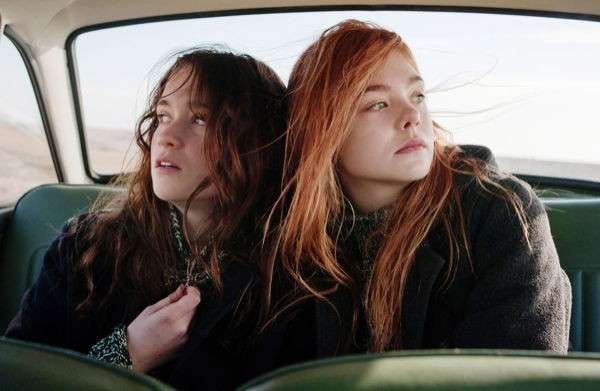
ALICE ENGLERT AND ELLE FANNING IN GINGER & ROSA
Red hair and tears
Sally Potter's Ginger & Rosa is a movie that's both ambitious and narrow. It primarily focuses on the quite limited lives, momentous only to them, of two teenage girls. But Potter chooses to stage her dual, feminine coming-of-age story in the England in 1962 for a reason. It's self-consciously a moment of transition -- on the cusp between the tail end of the Fifties, when the Brits were still struggling and haunted by the War, and the full-on Swinging Sixties, with their war protests, miniskirts, and Beatlemania. Can the vivid and luminously photographed story -- whose nice handheld camerawork (by Andrea Arnold dp Robbie Ryan), earth colors, and intense closeups are a pleasure to look at -- bear the weight of social commentary? Not so well, it turns out. Despite the distinctive visuals, nice (if inexplicable) jazz music, and accomplished acting, Ginger & Rosa is both claustrophobic and sappy. Its point that radical thinkers can make unreliable husbands and fathers is made in a trite and obvious way. Its constant harping on peace marches, nuclear terror, and the Cuban Missile Crisis hardly provides a rounded sense of the period. And it's a most peculiar movie about schoolgirls that never shows them really looking at boys, listening to pop music, or even going to school. Is all this what's meant by "auteur" -- a filmmaker who's willful and blind? Ginger & Rosa is a stylish visual poem, pretty and very personal, but also very limited.
After a while the eyes of Ginger (the young American actress Elle Fanning, blond hair dyed scarlet) seem to run with tears in nearly every scene. And for good reason. Her father, Roland (Alessandro Nivola, another Yank playing Brit), a pacifist professor formerly jailed for war resistance, is not so moral in his private life. He is mean to her mother Natalie (Christina Hendricks, the super-busty Joan of "Mad Men") and then leaves her, and gets Ginger's best friend Rosa pregnant. (Rosa is played by Alice Englert, the beautiful daughter of Jane Campion, but doesn't make much of an impression). Ginger, a redhead like her mother, joins a youth nuclear disarmament group . She also wants to be a poet; she reads T.S. Eliot. When Roland is having sex with Rosa she recites from "The Hollow Men": "This is the way the world ends/This is the way the world ends/Not with a bang but a whimper." Or maybe with both? No pun intended, one assumes, but it's an awkward moment.
Perhaps the self-centeredness of the girls is realistic for their age, but it further narrows the film's scope. Roland is a potentially more interesting character. He is noble, but an ass, and Nivola plays him sympathetically, though he still winds up seeming thoroughly despicable. He glows in the false light of Ginger's need for a father and the sublimated sexuality of Rosa's "admiration" of him. Roland conveniently has a boat on which the girlfriend and the father can get it on. Protest marches and meetings exist for the girls to be impressed by a vibrant young radical student leader (Andrew Hawley). Ginger is sure the world is about to end -- because she thinks so. An American leftist lady her father knows, Bella (Annette Benning, wasted and her character's role undefined) points out she has said the world as they know it "might" end, not that it "will" end.
There are a couple of other characters, Ginger's gay-couple godparents Mark and Mark (Oliver Platt and Timothy Spall). Platt plants a chaste kiss on Spall's forehead to indicate their relationship. In the film's rather sketchy structure, Mark and Mark hover nearby at moments of crisis to expand the movie's sense of a non-traditional family. When Roland starts sleeping with Rosa things get a bit too non-traditional, more like borderline illegal and almost incestuous. But again this being all about a girl's self-centeredness, the main point is that this relationship upsets Ginger. For once Rosa has struck out on her own. Most of these people are silly and superficial, and even when they take a valid stand, they do it in a self-centered way. If this is a feminist film, it doesn't make its case very well.
Ginger & Rosa, 90min., debuted at Telluride and played at Toronto and also in the 50th New York Film Festival at Lincoln Center, where it was screened for this review Oct. 8; it comes to the London Film Festival Oct. 13, and releases in the UK Oct. 19, 2012.
Last edited by Chris Knipp; 10-08-2012 at 04:48 PM.
-
Dror Moreh: THE GATEKEEPERS (2012)
DROR MOREH: THE GATEKEEPERS (2012)

AVI AVALON, SHIN BET HEAD 1996-2000, IN THE GATEKEEPERS
Security chiefs explain why Israel's not secure
First-time filmmaker's compelling documentary feature focused on six of Israel's latter-day Shin Bet security heads reveals the extent of the nation's violent preemptive or retaliatory actions against Palestinian "terrorists," who as one of them points out, are always somebody's "freedom fighters." This makes a good companion piece to Ra'anan Alexandrowicz's The Law in These Parts (2011; SFIFF '12), which focuses on a group of Israeli judges who sentenced Palestinians, coaxed into revealing a similar degree of moral queasiness about their work. Warning, though: both these films are relentless unreelings of talking-heads-plus-archival-footage. The speakers get challenged more in The Law, in part due to ingenious staging that makes the judges look like they'r on trial, partly because they are more prone to stonewallng and the interviewer is more aggressive in challenging them. The Gatekeepers comes across as less manipulative, its interviewees more cooparative. Moreh deseres credit for getting the six men to speak very freely, though they're not immune to the occasional question-dodging or fake memory lapse more frequently observable in The Law.
The reason for this freedom on the six Shin Bet retirees' part is an idea also expressed by the judges -- here Avraham Shalom (Shin Bet head from 1980-86) says it most bluntly: they do not trust the politicians and often look on themselves as the victims of their policies. One of them says the Occupation was a mistake, and ought to have been ended early on. From the immediate post-1967 War period, Gaza and the West Bank became breeding grounds of Palestinian resistance. Israeli security didn't know how to deal with the situation. Shalom says this and Avi Dichter (2000-06) confirms it. Eventually Shin Bet became an efficient operation. But the question arises: how much good could it do anyway? Both the cold-blooded 1996 assassination of the Hamas engineer and chief bomb maker Yahya Ayyash by an exploding telephone, "clean," quiet, killing only him, and the one-ton bomb on a populous neighborhood that killed a dozen or more innocent people, equally caused public outrage and motivated acts of retaliation by Palestinians. The failure of the ill-fated 1993-1995 Oslo Accords is mentioned as another factor leading to violence on both sides.
Another angle the Shin Bet heads bring out is the dangerous, essentially irresistible power of the Israeli right wing and orthodox rabbis, responsible for the 1995 assassination of the conciliatory prime minister Yitzhak Rabin (which caused a Shin Bet shakeup). Shin Bet was efficient enough to block a right wing plot to blow up the Dome of the Rock mosque, but because the plotters all had powerful connections, they were very soon out of jail and back in the community with positions of honor. A similar problem the film addresses, even more sweeping, is that of the settlements, which one Israeli prime minister after another has chosen to ignore and allow, covertly even boastful of increases of settlers on their watch.
Shalom describes the IDF, the Israeli army today as “a brutal occupation force that is similar to the Germans in World War II." Another says the country has become "cruel" and "a police state." Needless to say such statements on screen will inflame the Israeli right or Zionist hard liners, but underline that even today as the Jewish state drifts toward rightward, it still permits more criticism of Israeli policy than can be heard from US politicians or mainstream American Jews. The Shin Bet heads are insiders. They have seen where the Israeli security structure has worked and where it has failed. They never had any power to change the direction in which the country has been moving. They also are freer to adopt a liberal, critical stance than they were when in office.
The Gatekeepers gains more action-picture atmosphere than The Law in These Parts could, jazzing up shots of the 300 Bus hijacking and the capture and killing of its Palestinian hijackers with fast edits and sound effects and using computer simulations of security assaults on moving targets with an ominous soundtrack. Crowd sounds have been used to bring to live old still footage. But all this works only if the subject matter interests you intensely enough to overlook the familiar mix of talking heads and old footage.
The film's speakers -- and this is what makes it interesting -- are morally ambiguous and hard to judge. They take pride in ruthless targeted assassinations (though acknowledging that the power involved in such arbitrary decisions is questionable). But they are also as noted, highly critical of policies by which Israeli has created a constant state of war on itself. Four of the six retired security heads, Ami Ayalon, Avraham Shalom, Yaakov Peri and Carmi Gillon, gave a joint 2003 interview warning there would be a "catastrophe" if the country did not opt quickly for a two-state solution. Of course this has not happened, and they are no less concerned. Their voices need to be heard and, again, this is a good companion piece to The Law in These Parts' depiction of the legal double standard Israel has applied to Jews and Arabs. Note: both these films are excellent and deeply question Israeli policies. But they are from an Israeli, not a Palestinian, point of view. P.s.: Calling the Shin Bet "gatekeepers" seems to bear little relation to its counter-terrorist and retaliatory functions. Nonetheless: for any student of the Israel-Palestine issue, this is required viewing. The film's website gives bios of each of the six interviewees
The Gatekeepers, 96min., debuted at Jerusalem and showed also at Telluride and Toronto; it is a Main Slate selection of the New York Film Festival at Lincoln Center, where it was screened for this review. Released in the US by Sony Pictures Classics, the documentary opened November 26, 2012 in NYC at the Lincoln Plaza Cinema, Broadway at 62nd Street.
Last edited by Chris Knipp; 07-23-2014 at 11:09 PM.
-
Leos Carax: HOLY MOTORS (2012)
LEOS CARAX: HOLY MOTORS (2012)
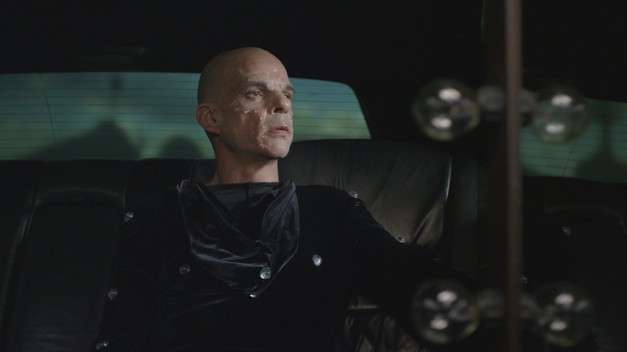
DENIS LAVANT IN HOLY MOTORS
Merde, etc.
Holy Motors is a phantasmagoric, eccentric and wonderful trip film that depicts the course of a single long day in the life of Monsieur Oscar (Denis Lavant), who travels around Paris by white stretch limo for a series of "appointments." He is a kind of actor who transforms into different characters each time, eleven in all. The interior of the limo is a dressing room, as elaborately equipped as young financier Eric Packer's nearly identical white limo in Cronenberg's (also one-day-spanning) Cosmopolis, (also shown first in competition at Cannes) and this film too ends with the limo drawing into a vast garage. Oscar is picked up from a mansion in the country by Céline (Édith Scob), his faithful chauffeur of the sad, elegant face, who calls his attention to the folders on his seat for each successive assignment. He begins the day disguised (only while in the back of the limo) as a wealthy banker ("Le banquier") -- perhaps who he "is"? His first "appointment" is as an aged crone ("La mendiante") who begs for change on a Paris bridge. We see him begin to put on his disguises, wigs, makeup, clothes. The next assignment (L'OS de Motion-Capture") is at a digital production studio where he dons motion laser-readable tights and does acrobatics.
This is followed by the most eccentric impersonation, an extraordinary troglodyte who or which steals a fashion model from Père Lachaise cemetery and takes her to his cave in the Paris sewers. This grows out of a 2008 short film Lavant and Carax did for the collection Tokyo!, is arguably the weirdest bit and was the starting point of the whole amazing film.
It's not clear (to me, anyway) whether the next "appointment" (le Père") even is one, or just life, it's so everyday-seeming and natural: Oscar gets himself up to look like an average dad and picks up his daughter from a party and drops her off at home. The next job, another rapid virtuoso display of changes ("Le tueur"), is a double assassination, and the one after that is a shooting on the sidewalk. Following this Carax goes into melodrama gear for a death scene influenced by Henry James' Portrait of a Lady. He's run through a panoply of genres by now, noir, actioner, meller, family drama, surreal fantasy, and there's musical romance and more to come -- a beautiful, touching sequence in the empty Samaritaine department store, with Australian singer Kylie Minogue, and a tragic ending.
I will not tell you about Oscar's last trip, to his "home" and "family" (" L'homme au foyer") except to say there has been a species change. I omitted one vibrant short sequence, after "Le Père," the Entr'acte/Interval/Intermission in which Oscar marches and sings and plays the accorion in a band ("L'accordéoniste "). But to fullly describe this film with all its allusions, its jokes, its surprises, its secrets, would take a volume.
And what are we to make of all this? The amusements of an insanely idle rich man? Multiple personality disorder, caused by some trauma? "The next evolution in entertainment," (as indicated in a conversation with a shadowy boss figure played by Michel Piccoli)? Or "a bizarre fantasy of movie-making" as suggested by the intro featuring a sleepy Carax himself crawling from bed into a crowded cinema, as Rob Nelson of Variety points out? Or -- why not simply "pure pleasure," as the Guardian's Peter Bradshaw decides? Anyway Holy Motors is extraordinary, a cinephile's delight (and a conventional movie-goer's annoyance or nightmare), and whether endlessly fascinating or just quite nutty, certainly a hilarious and audacious, authentically and deeply surreal, highly allusive and highly cinematic genre-busting original of a film. It's never quite defined what Monsieur Oscar's "work" means, but he seems to be blending acting with life, in a wildly more beautiful version of what goes on in Giorgos Lanthimos' relatively humorless and flat 2011 film Alps (SFIFF '12).
From Cannes, the AV Club correspondent Mike D'Angelo tweeted a, for him, astronomical score for Holy Motors of 88. His runners-up were Haneke's Amour (77) and Anderson's Moonrise Kingdom (75), followed by, further down the scale, Ursula Meier (Sister), Matteo Garrone (Reality) and Jacques Audiard (Rust and Bone). Next to Carax's 88 in D'Angelo's Tweet review was just a two-word comment, "Holy shit," which can be read as an expression of balls-out awe or a sly reference to the film's origins in the Tokyo! "Merde" episode, maybe both. Seeeing all those powerful films at Cannes in close proximity, D'Angelo rated Carax highest. It's a cinematic mindblower. D'Angelo correctly predicted that it wouldn't win a top prize (Haneke and Garrone got those), he thought because the jury just wasn't daring enough, but he was disregarding that some viewers really hate this film. He predicted it would be the film Cannes 2012 will be remembered for. It did win a prize at Cannes, the Prix de Jeunesse (awarded by a jury of 18 to 25-year-olds).
In the Q&A at the New York Film Festival press screening, Carax said his theme was the question "whether we still want to experience stuff, do action." He has also commented that stretch limos strike him as interesting anachronisms, out of date, depicting "the end of an era, the era of large, visible machines." Other themes are cinema, acting, life, transformation, the protean nature of existence -- and a homage to the protean abilities of Denis Lavant, whom Carax says he does not know, is not friends with, and has barely ever talked to in real life, but who is obviously a remarkable collaborator and essential to this film. These cryptic, intentionally unrevealing details actually reveal something: an intuitive and original filmmaker who has some deep thoughts about what acting and cinema do, though the film can be read as nothing but a series of eccentric riffs -- till you start thinking about it. Whether this is a masterpiece or a curio is worth mulling over. But it strikes me as I'd expected: as a standout title in the Main Slate of the 2012 New York Film Festival.
Holy Motors, 116 min., debuted at Cannes, opened in France July 4, where it received a galaxy of critical raves (Allociné 4.3) but a lukewarm Allociné spectator response (2.9) indicative that this adventurous watch is a hard box office sell. Screened for this review as part of the New York Film Festival at Lincoln Center. It opens in New York Oct. 17; US national release Nov. 9.
Last edited by Chris Knipp; 07-23-2014 at 11:44 PM.
 Posting Permissions
Posting Permissions
- You may not post new threads
- You may not post replies
- You may not post attachments
- You may not edit your posts
-
Forum Rules





 Reply With Quote
Reply With Quote






Bookmarks